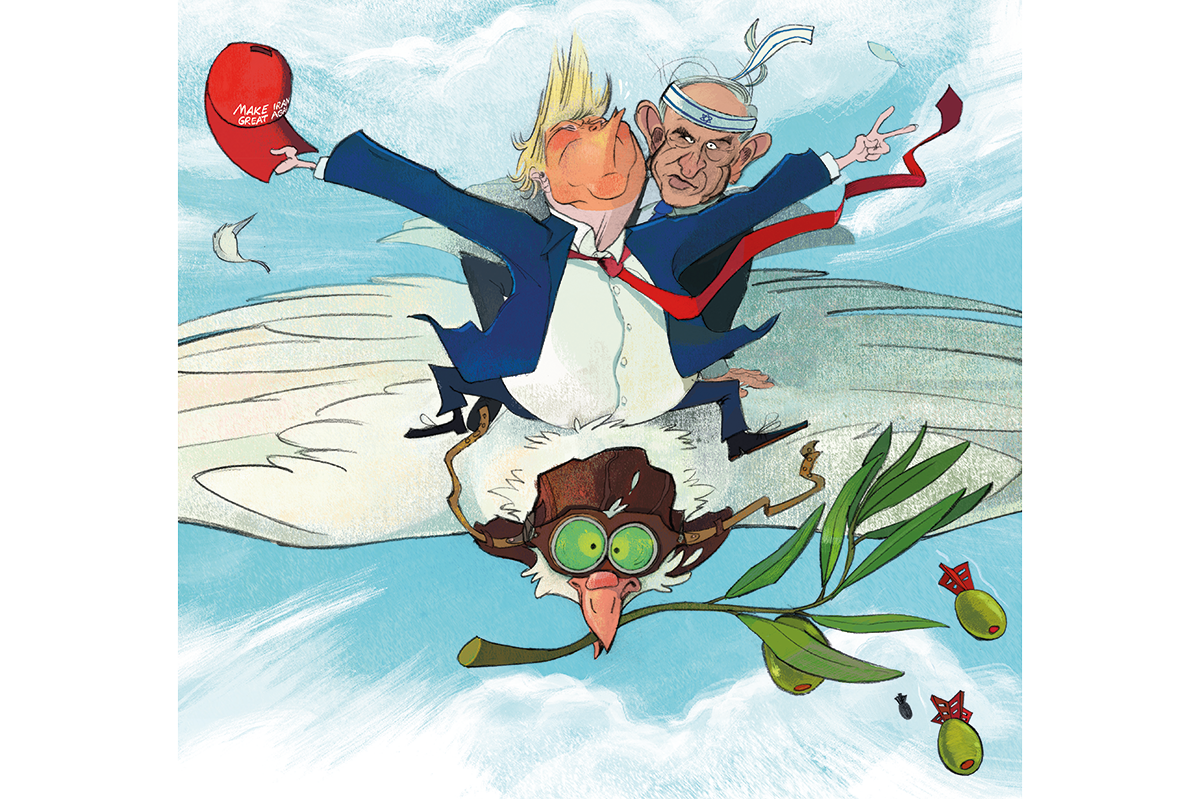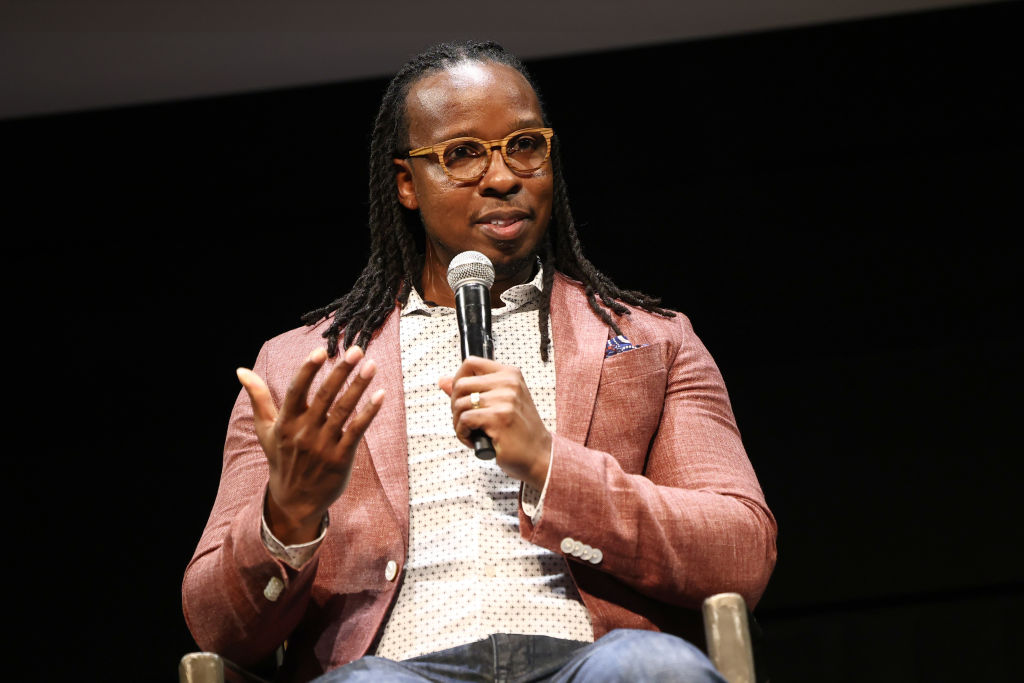A couple of years ago, I took a shuttle train at London’s Heathrow airport, heading to the medium- and long-haul gates. I was standing at the end of the carriage, and as the ends of the carriages were mostly made of smoked glass, I could see into the carriage behind. A group of Orthodox Jewish men stood on the other side of the glass in full sectarian fig — beards and sidelocks, long coats and vaguely Habsburg Homburgs, the Bronze Age waistcoat of the tallit katan and its knotted fringes.
Through the glass, I could see the other passengers staring with curiosity; fair enough, given that almost everyone else in the carriage seemed to be wearing Lycra and sweat-wicking leisurewear. But I could also see faces expressing a gamut of discreditable emotions: irritation, contempt, rage, loathing. This, I realized, might not be how they saw me, but it was certainly how they thought of me. Anti-Jewish attitudes are the dark mirror of the mind that used to be Christian, but is now merely Western. As the diverse joys of mass immigration have proven in Europe, the same usually goes for the mind that is still Muslim. When a couple of the passengers saw me watching them as they stared at the others, they looked away, perhaps in embarrassment, perhaps in shame. Call it progress.
America, though, was meant to be different. As a communal aggregate, American Jews are the cream of the Diaspora: rich and thick. The Jews here are the richest community in history, and thick in professional attainment. In meritocratic America, even the president recognizes this: ‘The only kind of people I want counting my money are the little short guys that wear yarmulkes every day.’ But American Jews are generally poor and thin in the depth and breadth of their Jewishness. For most of them, Jewishness is not the holy trinity of peoplehood, Torah and the Land of Israel, but a deracinated smugness, equal parts high-cholesterol, stand-up comedy and the Democratic platform of 1960.
‘Many American Jews themselves lack any real historical understanding of where they come from,’ Bari Weiss writes in How to Fight Anti-Semitism. ‘They’ll check a box saying that Judaism is a religion. They might describe themselves as a people with a particular passion for Seinfeld and hummus. That’s as true as far as it goes. But it doesn’t go very far.’
In good times, Weiss writes, Jewish ignorance is not a ‘high-stakes’ matter. But these aren’t good times: ‘in times of rising anti-Semitism, however, it begins to matter a great deal’. The crucial words here are ‘rising’ and ‘begins’. She senses a ‘a storm threatening’, but these are still good times for American Jews: ‘I have always considered myself among the luckiest Jews in all of history,’ Weiss writes, and not because she has a column at the New York Times.
Born an American after 1945, Weiss inherited the postwar wave of affluence, and the surge of tolerance that it funded. That affluence has long run out for most Americans, and with it their tolerance. Weiss is a vocal opponent of Donald Trump, whose election notified her fellow residents of the Upper West Side that something was amiss. ‘The truth,’ Weiss writes, ‘is that deeper cultural and political forces surging on the right and left are transforming the country… the center is not only not holding, it is bending toward and being distorted by the extremes on both the ethnonationalist right and the anticolonialist left.’
The collapse of civility and the liberal center has ‘profound implications for a group that constitutes less than 2 percent of the population’, but also for the other 98 percent. In one of many useful commonplaces, Weiss reminds us that a society’s attitude to Jews is a reliable barometer of its political health. Weiss positions herself on the collapsing center ground. She quotes the lines, well-known to Jewish pessimists, from Joachim Fest’s memoir, Not I, in which Fest’s Catholic father begs his Jewish friends to leave Nazi Germany while they still can. ‘In their self-discipline, their quiet civility and unsentimental brilliance, they had really been the last Prussians,’ Fest wrote. Their ‘one failing’ became ‘their undoing: being overwhelmingly governed by their heads, they had, in tolerant Prussia, lost their instinct for danger, which had preserved them through the ages’.
American Jews aren’t noted for their self-discipline, quietness, civility, or unsentimentality, and they seem to devote much of their hypothetical brilliance to making apps, but still, the parallel holds. Weiss possesses that instinct for survival, and this book is her handbook for American Jews disorientated by sentiment, habit, fear and the daily business of living. The book proceeds from personal testimony, to a quick historical overview of anti-Judaic thought and action, to three chapters on current threats to American Jewish life (from the right, the left and radical Islam) and, finally, advice on ‘How To Fight’. If you are as ignorant as most American Jews are, it’s worth a read.
Weiss was already working on a book about anti-Semitism in Europe when white racist Robert Bowers shot up the Tree of Life, the Pittsburgh synagogue in which she had been bat mitzvah’d. She was in Arizona when she heard. ‘Those words would wake me up to the fact that I had spent much of my life on holiday from history. And history, in a hail of bullets, had made its unequivocal return.’ A curious claim, given that she compares her shock to her experience after history’s return in the 9/11 attacks. Walking through Phoenix airport to catch a flight to Pittsburgh, she sensed her fate diverging from those around her: ‘Everything was so miraculous. Everything was so fragile.’
Everything is so American. Oscar Wilde said that the innocence of America was one of its oldest traditions. No serious historian of American Jewish history should claim that innocence. The Immigration Act of 1924 was created largely to keep Jews out. The United States closed its borders to Jewish refugees before 1939, and did its best not to admit any after 1945. The United States was invented as a holiday from history, and this fantasy of innocence and reinvention is the foundation of its civil religion. American Jews subscribe to it with a fervor unmatched by other Americans, with the exception, ironically, of angry white Trump voters.
That fervor has long become the undoing of American Jews. In the last century, they were more concerned with securing a spot on the center ground of American life than with the safety of their cousins in Europe. American Jews abandoned the Jews of Europe to the body pits and gas chambers, then had the gall to erect a secular cult of the Holocaust. They boast of Israel’s success, then dump it when times get difficult. When I visited Israel during the suicide bombings of the Second Intifada, the hotels had lots of Christian pilgrims, some European Jews, and some Orthodox American Jews. The rest of America’s Jews simply abandoned their cousins once more. They abandoned them again when the Obama administration called the American Jewish organizations’ bluff over the Iran deal, which was merely an existential danger to Israel, but a serious obstacle to American Jews’ amity with the Democratic party.
Weiss gives a workable summary of the history of anti-Semitism, which is no mean feat in a short chapter. Her summaries of the growth of anti-Judaic ideology among the particularist racists of the right, the universalist puritans of the left, and the barbaric millenarians of Islamism aren’t bad either. I hadn’t previously understood why Weiss so enrages her fellow millennials. I found her to be an efficient and friendly copy editor when she worked for the Wall Street Journal, and the same when we met for the first time after her move to the New York Times. The prejudices against Israel and Zionism that are part of the liberal college curriculum can’t be denied. Neither can ecumenical jealousy: in a generation struggling to find proper jobs, and in a business in a commercial spiral, Weiss landed a plum job at the Times.
Reading Weiss’s chapters on the rise in anti-Judaic incitement and violence, I realized why she possesses magical powers of derangement. She insists that she is a liberal in the old, classical sense, yet she argues, on invincible evidence, for Jewish particularism. This enrages the left-wingers who mask their sentimental Marxism as ‘liberalism’. Part of the irritation can be attributed to Freud’s ‘narcissism of small differences’ — Weiss and her leftist enemies are fighting over the remains of Enlightenment rationality and 20th-century liberalism. But part of it reflects a deeper difference, which cuts to the core of left-wing hypocrisy.
The left advance universalism in the name of freedom, but not all claims to freedom are equal. Long before the current folly of intersectionality, Jews were condemned to collective extinction by Kant, the godfather of progressives; by the vulgar Darwinism of Marx and Engels; and yes, by the sentimental democratic liberalism that, like the French Revolution, promised everything to Jews as individuals in return for them demanding nothing as a people. If the Jews are the canary in the coal mine, the poisonous vapors from the left have long proved fatal. Weiss performs a great service simply by expressing herself so candidly.
You can hear heads exploding on campus and Twitter when Weiss, in the space of two pages, states three simple historical truths: ‘Progressives have, knowingly or unknowingly, embraced the Soviet lie that Israel is colonialist outpost’, ‘The idea behind [intersectionality] is deeply appealing because it observes something that is obviously true’, and ‘anti-Semitism is a normative message’ from Muslim governments, preachers and societies.
Weiss’s liberalism aids her exposure of the illiberal left and its fellow-traveling with Islamists. But the same preferences tie her analysis of the right in knots, and undermine her ‘How To Fight’ principles. If, as Weiss rightly argues, anti-Semitic impulses are a hard-wired response to other anxieties, then the smart Jewish response to public anger at mass immigration isn’t ‘a deep, visceral reaction in favor of welcoming newcomers’, but a non-sentimental grasp on democratic reality, regardless of what the ACLU thinks. If, as Weiss states, Muslim immigrants to Europe are off-the-charts Jew-haters, what would be a smart American Jewish response to Muslim immigration into the United States? She doesn’t say.
‘Maintain your liberalism’ is a plank of the ‘How To Fight’ platform. Under present circumstances, this like asking turkeys to vote for Christmas. As Hillel Halkin noted in a sharp review in Weiss’s own paper, there is nothing inherently Jewish about liberalism, and a great deal that is antithetical. The same goes for the ‘How To Fight’ injunction to ‘vote for freedom’. Judaism isn’t about freedom: it’s about taking on the ‘yoke of Torah’ and other uncomfortable burdens likely to cause staring and incomprehension. If, as Weiss correctly argues, it’s good to ‘Build community’, then reducing your liberalism and choosing to limit your freedom are good for the Jews.
Weiss argues that supporting Israel is a key defense of Diaspora identity, yet she remains utterly opposed to the most pro-Israel president in American history: ‘On the one hand, his daughter and her husband are religiously observant Jews; in 2016, he boasted that Ivanka was “about to have a beautiful Jewish baby” during a speech to the American Israel Public Affairs Committee, or AIPAC, a pro-Israel lobbying group. To many, he appeared to be a philo-Semite, though as Deborah Lipstadt has sharply pointed out, a philo-Semite is merely “an anti-Semite who likes Jews”.’
On the other hand, Weiss says nothing germane. Trump has insulted African Americans, Mexicans and people from ‘shithole countries’. All true, of course, but not, by Weiss’s own criteria, a reason to follow ‘How-To-Fight’ principles like ‘Tell the truth’, ’Praise those who do the right thing’, and ‘Notice your enemies. But even more, notice your friends.’ Trump is a father and grandfather to Jews, and a strong supporter of Israel. You don’t get to pick your friends or enemies if you’re a two-percent people. American Jews should drop the sentimentality and acknowledge where their interests now lie.
Weiss also identifies the immediate threat of violence from the racist right as less of a threat to Jewish life in America than the institutionalized hostility from the left. This is inarguable from the historical record, which now seems inarguably to have started playing again in America. And that might be a further reason for Weiss to reconsider her call for Jews to go down with the sinking center. Imagine the positive influence she might have on the recidivists on the right if she declared that, though she might be a classical liberal in principle, her only political allies are conservatives.
I was surprised to read that a careful historian like Lipstadt had used ‘merely’ in the complex context of the philo-Semitic/anti-Semitic nexus. As far as I can find from online searches, Lipstadt never has. She did use the old gag about philo-Semitism being anti-Semitism backwards in talks in March and April 2019, but she didn’t reduce it to a simplistic and insulting binary. American Jews have plenty of friends, notably on the right of the Republican party that Weiss dismisses as alt-righters, pitchfork-wielders and tin-hatters. She also enjoins Jews to ‘Expect solidarity’. The other 98 percent of Americans are, with the exception of the leftmost third of the Democratic party and affiliated groups like African Americans and academics in the humanities, the most philo-Semitic people in the world.
This is not the only error of fact. Goronwy Rees is described, as per his Wikipedia entry, as a ‘journalist and academic’, but Rhys, though he produced much journalism and contributed to government reports, never produced any academic work. He was a college principal for four years in the 1950s, and a Fellow of All Souls, Oxford, which is essentially a dining club for clever people.
Weiss writes that in the British town of Rotherham, ‘at least 1,500 girls and boys were groomed, trafficked and raped by a group of Islamist men, mostly of Pakistani origin’. The official estimate was approximately 1,400 victims, not 1,500; the New York Times later changed this to ‘at least 1,400’; the total number of ‘potential victims’ is 1,510. There is no evidence that the convicted men were ‘Islamists’, as opposed to Muslim pedophiles. According to police, one in five of the Rotherham suspects was not Muslim at all.
Is the colleague that Weiss thanks as ‘James Bennett’ her colleague James Bennet? And is Weiss’s friend ‘Jamie’, who is described as having been spat on while wearing a kippah on the way to a wedding in Berlin, the Jamie Kirchick who was recently spat on while wearing a kippah on the way to a wedding in London?
Weiss’s ‘answer’ to anti-Semitism is the traditional Jewish one: to build and ignore the destroyers. ‘Call it out. Especially when it’s hard,’ she says. ‘Since when is being a fun guest at a dinner party more important than standing up for what matters?’
I couldn’t agree more. When the historians come to write the story of how Jewish history returned to the United States in a hail of platitudes, they will note that no newspaper or television channel did more to make anti-Judaic bigotry acceptable in polite company than the New York Times.
Dominic Green is Life & Arts Editor of Spectator USA.


























